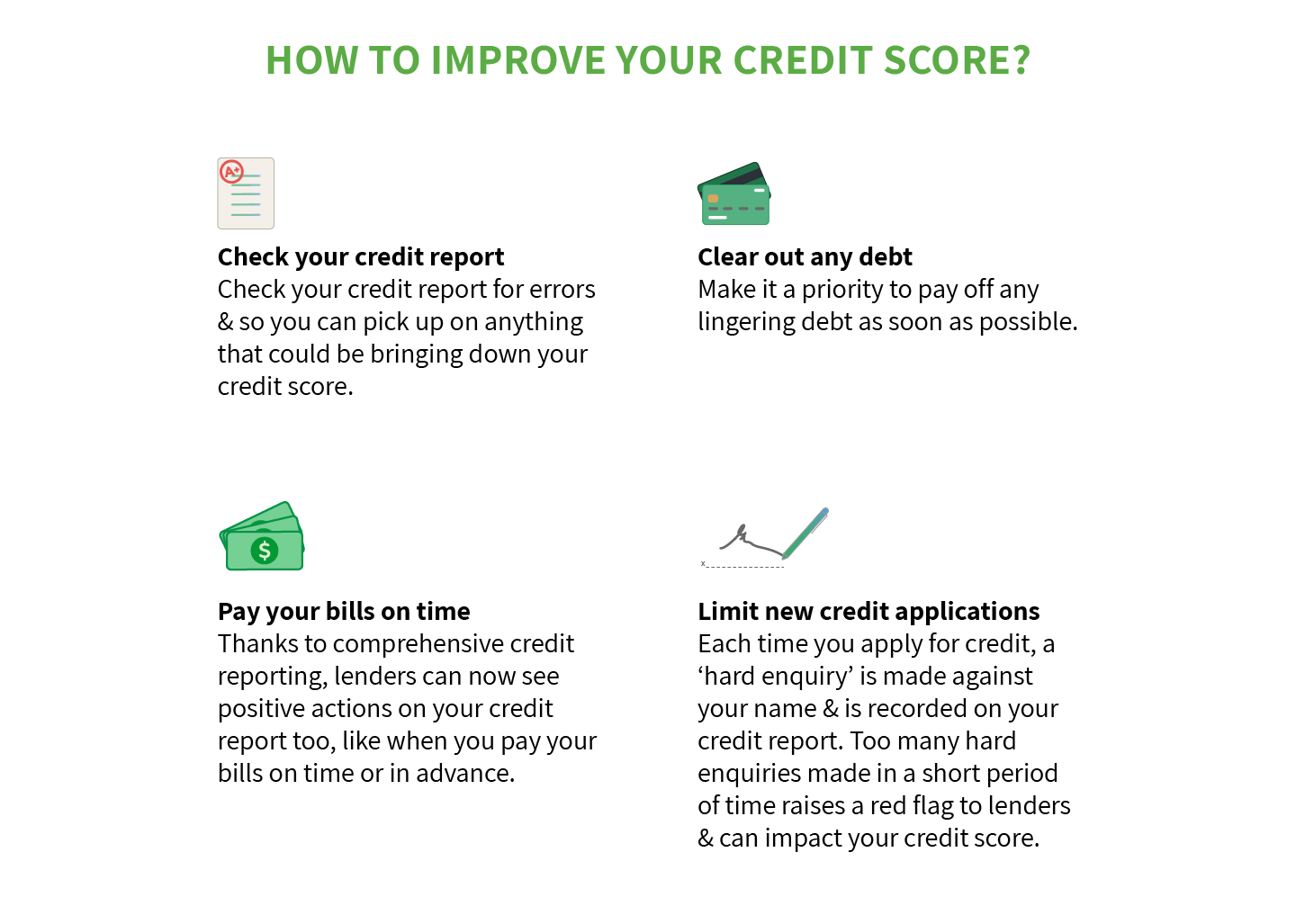
A Guide to Loans for Bad Credit

Whether you’re applying for a home loan, personal loan, car loan, business loan or any other type of loan, it can be very difficult to get approved with a bad credit score. So, it’s super important to get your credit report into good shape before applying.
What is a credit score?
Before we dive into what makes a credit score good or bad, first here’s a quick rundown on what a credit score actually is.
Credit scores in a nutshell:
To put it simply, your credit ‘score’ or ‘rating’ is a number between 0 and 1,000 (or 1,200 depending on the credit reporting agency) that’s based on the various personal and financial information found within your credit report such as whether you pay your bills on time, how often you pay them or if you’ve paid them at all.
When you apply for a loan or credit card, the lender will assess your credit score to determine whether they should lend money to you. The higher the credit score, the better your chances are of being approved.
Can I get a loan with bad credit?
A bad credit rating is a major red flag to lenders. When applying for a loan, the lender wants to know that you’re a good borrower who can commit to paying the loan back. They’ll be less likely to approve you for a loan if you have a bad credit score.
While it’s not impossible to get approved for a loan with bad credit, it is probably more important that you spend time rebuilding your credit rating first before applying for a new loan.
Why do I have a bad credit rating?
Not paying your bills on time, missing repayments, defaulting on a loan or falling into bankruptcy are all factors that can all lead to a bad credit score. If you’re guilty of any of these things, then it’s time to start forming better money habits and improving your credit score.
How do I fix my bad credit rating?
There are a number of different things you can do to fix a bad credit rating, such as:
1. Check your credit report:
Firstly, you’ll want to get your hands on your credit report so that you can determine what’s bringing down your credit score. Then work on improving in that area. You can generally request a free copy of your report every 12 months via Equifax, Experian, CheckYourCredit or any other Australian credit reporting body.
Once you’ve got a copy of your credit report, check for any errors. Should you find any inaccurate information report it to the relevant bank or lender as well as with the credit reporting body.
If you can’t resolve the issue with the parties involved and need extra assistance, then you might choose to make a complaint with AFCA (the Australian Financial Complaints Authority).
2. Clear any debt
Another way to help repair your credit score is by clearing out any lingering debt. If you have an unpaid bill of $150 or more and 60 days have passed since you’ve heard from the debt collector, then the debt will be recorded on your credit report as a credit default. It will remain there for five years.
So, if you have any overdue bills or other outstanding debt, then make it a priority to pay it off as soon as possible. If you are unable to keep up with repayments, don’t ignore the problem. Reach out to your bank or credit card provider as most financial institutions will have hardship considerations and will help to find a solution. Alternatively, you could contact the free National Debt Helpline for extra assistance.
3. Start paying your bills on time
Thanks to the introduction of comprehensive credit reporting, lenders now have a more in-depth view of your credit history. This means that lenders can now see when you consistently pay your bills on time or make extra loan repayments.
By the same token, this means they can also see if you’ve made late repayments or if you’ve ever defaulted on a loan. So it’s essential to adopt better spending habits and pay your bills on time so that you can maintain a clean credit report.
4. Limit new credit applications
Every time you apply for a loan or other line of credit, the lender runs a ‘hard enquiry’ (a formal credit check) as part of the application process. Each time a hard enquiry is made against your name it is recorded on your credit report.
If you make too many hard enquiries within a short period of time your credit score could take a hit, as it can make you appear financially reckless in the eyes of the lender. This is why it is so important to do your shopping around first and compare loans before you apply. Be confident that you can make the repayments by crunching the numbers with our loan repayments calculator.


